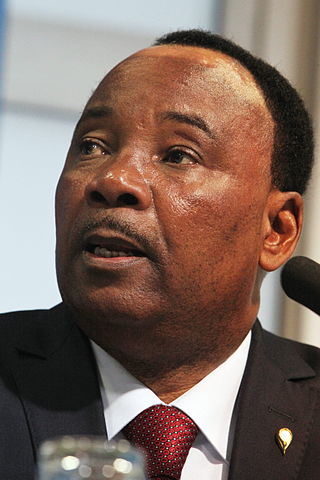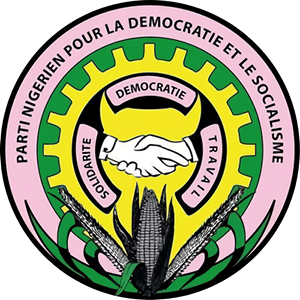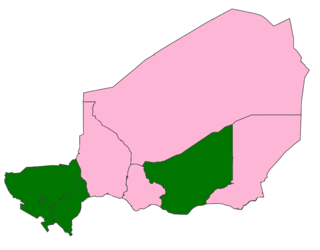This is the history of Niger. See also the history of Africa and the history of West Africa.

Elections in Niger take place within the framework of a semi-presidential system. The President and National Assembly are elected by the public, with elections organised by the Independent National Electoral Commission (CENI).

Mahamadou Issoufou is a Nigerien politician who served as the president of Niger from 7 April 2011 to 2 April 2021. Issoufou was the prime minister of Niger from 1993 to 1994, president of the National Assembly from 1995 to 1996, and he was a candidate in each presidential election from 1993 to 2016. He led the Nigerien Party for Democracy and Socialism (PNDS-Tarayya), a social democratic party, from its foundation in 1990 until his election as president in 2011. During the presidency of Mamadou Tandja (1999–2010), Issoufou was the main opposition leader.

The National Movement for the Society of Development, also known as the National Movement for the Development of Society is a political party in Niger. Founded under the military government of the 1974–1990 period, it was the ruling party of Niger from 1989 to 1993 and again from 1999 until 2010, when a coup on 18 February 2010, by a military junta called the Supreme Council for the Restoration of Democracy (CSRD) ousted the president, Mamadou Tandja.

The Nigerien Progressive Party – African Democratic Rally is a political party in Niger. It was the leading political party of the pre-independence era, becoming the sole legal party of the First Republic (1960–1974). It was led by Niger's first President, Hamani Diori. After the end of military rule, the party reappeared as a minor parliamentary party led by Diori's son, Abdoulaye Hamani Diori.

The Nigerien Self-Management Party is a political party in Niger led by Sanoussi Jackou. "Al'ouma", the party's nickname, is an Arabic loan word meaning "Community" in Hausa.

The Union for Democracy and the Republic is a political party in Niger. Its founding leaders were former Prime Minister Amadou Cissé and Amadou Madougou.

The Rally for Democracy and Progress is a political party in Niger, led by Hamid Algabid. It was established as the ruling party during the presidency of Ibrahim Baré Maïnassara.

The Nigerien Alliance for Democracy and Progress is a political party in Niger. Moumouni Adamou Djermakoye led the party from its foundation in 1992 until his death in 2009.

The Nigerien Party for Democracy and Socialism is a political party in Niger. It is a broadly left-leaning party, part of the Socialist International, and in 2011, it has been in power following the election of the former long-time leader, Mahamadou Issoufou. Mohamed Bazoum is the former President of the party and the former Secretary-General is Foumakoye Gado.

The unicameral National Assembly is Niger's legislative body. The National Assembly proposed laws and was required to approve all legislation.
Moumouni Adamou Djermakoye was a Nigerien politician and the President of the Nigerien Alliance for Democracy and Progress. He was an important minister during the regime of Seyni Kountché and subsequently served as Niger's Ambassador to the United States from 1988 to 1991; later, after founding the ANDP, he served as President of the National Assembly of Niger from 1993 to 1994. He was the ANDP's candidate in four presidential elections, beginning in 1993; he was also a deputy in the National Assembly from 1999 to 2009 and the President of the High Court of Justice from 2005 to 2009.

General elections were held in Niger in 1999; the first-round of the presidential elections was held on 17 October, with a run-off held alongside National Assembly elections on 24 November. The elections followed a coup d'état on 9 April, in which Ibrahim Baré Maïnassara, who had led an earlier coup in January 1996 and won disputed presidential elections, was assassinated. Coup leader Daouda Mallam Wanké initiated a transitional period that concluded with the victory of Mamadou Tandja, the candidate of the National Movement for the Society of Development (MNSD), over Mahamadou Issoufou, the candidate of the Nigerien Party for Democracy and Socialism (PNDS), in the run-off. The vote for the first National Assembly of the Fifth Republic, which had originally been scheduled for October, but delayed in August, also saw a victory for the MNSD, which won 38 of the 83 seats. It formed a coalition with the Democratic and Social Convention in order to gain a majority in the Assembly.

The Union of Popular Forces for Democracy and Progress–Sawaba is a political party in Niger, founded as the Nigerien Democratic Union in 1954. The original party, founded by Nigerien Progressive Party (PPN) co-leader Djibo Bakary when he was expelled from the PPN. In the mid-1950s it created a broad coalition led by urban leftists but forged of conservative rural notables, especially from Hausa areas, which dominated the nascent Nigerien independence movement. In this period it was renamed Mouvement Socialiste Africain–Sawaba, and then simply Sawaba. In pushing for complete independence from France in a 1958 referendum, the party fractured. At independence in 1960 it found itself in opposition and outlawed by Niger's first president, Hamani Diori. From exile, the party attempted an abortive guerrilla campaign in the mid-1960s, and then largely disappeared. Its leadership returned to Niger following the 1974 military coup, but soon found themselves arrested, in exile, or marginalised. Following the return of democracy in 1991, the now elderly Bakary re-founded the party as UDFP–Sawaba. In the 1993 elections it took only a small numbers of votes. Within the year the party had split, with a new faction (UDFR–Sawaba) joining the government coalition. Despite Bakary's death in 1998 and their continued electoral underachievement, both parties holding the Sawaba name continue.

The government of Niger is the apparatus through which authority functions and is exercised: the governing apparatus of Nigerien state. The current system of governance, since the Constitution of 25 November 2010, is termed the Seventh Republic of Niger. It is a semi-presidential republic, whereby the President of Niger is head of state and the Prime Minister of Niger head of government. The officials holding these posts are chosen through a representative democratic process of national and local elections, in the context of a competing multi-party system. Executive power is exercised by the government. Legislative power is vested in both the government and the National Assembly. The judiciary is independent of the executive and the legislature: its Constitutional Court has jurisdiction over constitutional and electoral matters.

The Alliance of the Forces of Change was one of the two large political coalitions which contested for power in Niger from 1991 to 1996.

Parliamentary elections were held in Niger on 12 January 1995. The last elections of the Third Republic, they were called following a split in the ruling coalition, but resulted in a government divided between the party of the President and an opposition coalition with a majority in the National Assembly and the post of Prime Minister. The ensuing stalemate was a contributing factor to the coup that overthrew the regime on 27 January 1996.

General elections were held in Niger on 21 February 2016, with a presidential run-off held on 20 March. A total of 15 candidates ran for the presidency, with incumbent President Mahamadou Issoufou running for re-election for a second term. There were two main opposition candidates also vying for the top post, Seyni Oumarou of the National Movement for the Society of Development (MNSD), who lost to Issoufou in 2011, and Hama Amadou of MODEN/FA, who has been campaigning from prison since November 2015. Most of the opposition agreed to align for the second round to back the second-placed candidate against Issoufou.

General elections were held in Niger on 27 December 2020 to elect the President and National Assembly. With incumbent president Mahamadou Issoufou stepping down following his two terms constitutional limit, new presidential candidates competed for office. As no presidential candidate received a majority of the vote on the first round, a second round was held on 21 February 2021. The ruling Nigerien Party for Democracy and Socialism (PNDS) candidate Mohamed Bazoum was declared the winner, beating Mahamane Ousmane in the second round with 56% of the vote. In the National Assembly elections the PNDS won 79 of the 166 seats, falling just short of a majority.







